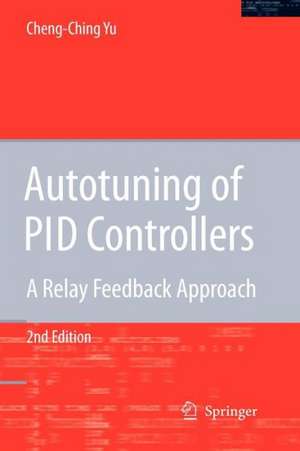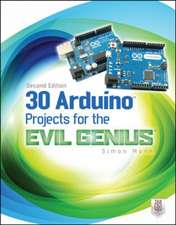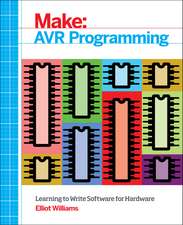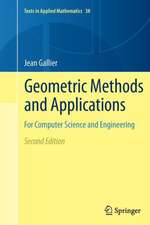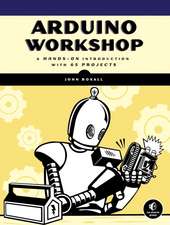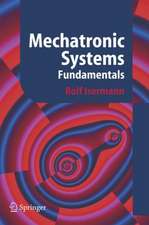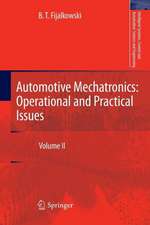Autotuning of PID Controllers: A Relay Feedback Approach
Autor Cheng-Ching Yuen Limba Engleză Paperback – 14 mar 2012
The extensively revised second edition covers:
• Derivation of analytical expressions for relay feedback responses.
• Shapes of relay responses and improved closed-loop control and performance assessment.
• Autotuning for handling process nonlinearity in multiple-model-based cases.
• The impact of imperfect actuators on controller performance.
This book is more than just a monograph, it is an independent learning tool applicable to the work of academic control engineers and of their counterparts in industry looking for more effective process control and automation.
| Toate formatele și edițiile | Preț | Express |
|---|---|---|
| Paperback (1) | 639.41 lei 6-8 săpt. | |
| SPRINGER LONDON – 14 mar 2012 | 639.41 lei 6-8 săpt. | |
| Hardback (1) | 644.63 lei 6-8 săpt. | |
| SPRINGER LONDON – 26 oct 2005 | 644.63 lei 6-8 săpt. |
Preț: 639.41 lei
Preț vechi: 752.24 lei
-15% Nou
Puncte Express: 959
Preț estimativ în valută:
122.36€ • 130.84$ • 102.01£
122.36€ • 130.84$ • 102.01£
Carte tipărită la comandă
Livrare economică 17 aprilie-01 mai
Preluare comenzi: 021 569.72.76
Specificații
ISBN-13: 9781849965460
ISBN-10: 1849965463
Pagini: 276
Ilustrații: XIV, 261 p. 140 illus.
Dimensiuni: 155 x 235 x 14 mm
Greutate: 0.39 kg
Ediția:2nd ed. 2006
Editura: SPRINGER LONDON
Colecția Springer
Locul publicării:London, United Kingdom
ISBN-10: 1849965463
Pagini: 276
Ilustrații: XIV, 261 p. 140 illus.
Dimensiuni: 155 x 235 x 14 mm
Greutate: 0.39 kg
Ediția:2nd ed. 2006
Editura: SPRINGER LONDON
Colecția Springer
Locul publicării:London, United Kingdom
Public țintă
ResearchCuprins
Features of Proportional-Integral-Derivative Control.- Relay Feedback.- Shape of Relay.- Improved Relay Feedback.- Multivariable Systems.- Load Disturbance.- Multiple Models for Process Nonlinearity.- Control Performance Monitoring.- Imperfect Actuators.- Autotuning for Plantwide Control Systems.- Guidelines for Autotune Procedure.
Textul de pe ultima copertă
Recognising the benefits of improved control, the second edition of Autotuning of PID Controllers provides simple yet effective methods for improving PID controller performance. The practical issues of controller tuning are examined using numerous worked examples and case studies in association with specially written autotuning MATLAB® programs to bridge the gap between conventional tuning practice and novel autotuning methods.
The extensively revised second edition expands and refines on important work in the ubiquitous PID form of control with material covering:
• Derivation of analytical expressions for relay feedback responses with tabulated results for easy reference.
• The use of shapes of relay responses to generate information for improved closed-loop control and performance assessment.
• The applications of autotuning to multiple-model-based cases for handling process nonlinearity.
• The use of feedback shapes to generate information for performance assessment.
• The impact of imperfect actuators on controller performance.
Autotuning of PID Controllers is more than just a monograph, it is an independent learning tool applicable to the work of academic control engineers and of their counterparts in industry looking for more effective process control and automation.
Comments on the first edition:
This book is written in a way which not only makes it easy to understand but is also useful to those interested in or working with PID controllers.
Assembly Automation
The book will be useful to manufacturers and users of control equipment, and also to researchers in the field of automatic tuning.
Automatica
The extensively revised second edition expands and refines on important work in the ubiquitous PID form of control with material covering:
• Derivation of analytical expressions for relay feedback responses with tabulated results for easy reference.
• The use of shapes of relay responses to generate information for improved closed-loop control and performance assessment.
• The applications of autotuning to multiple-model-based cases for handling process nonlinearity.
• The use of feedback shapes to generate information for performance assessment.
• The impact of imperfect actuators on controller performance.
Autotuning of PID Controllers is more than just a monograph, it is an independent learning tool applicable to the work of academic control engineers and of their counterparts in industry looking for more effective process control and automation.
Comments on the first edition:
This book is written in a way which not only makes it easy to understand but is also useful to those interested in or working with PID controllers.
Assembly Automation
The book will be useful to manufacturers and users of control equipment, and also to researchers in the field of automatic tuning.
Automatica
Caracteristici
Reports significant recent progress in feedback autotuning helping to establish more effective control by making model identifiation easier and more accurate The extension of autotuning to multiple models allows its employment by readers using a wide range of non-linear processes Includes supplementary material: sn.pub/extras
